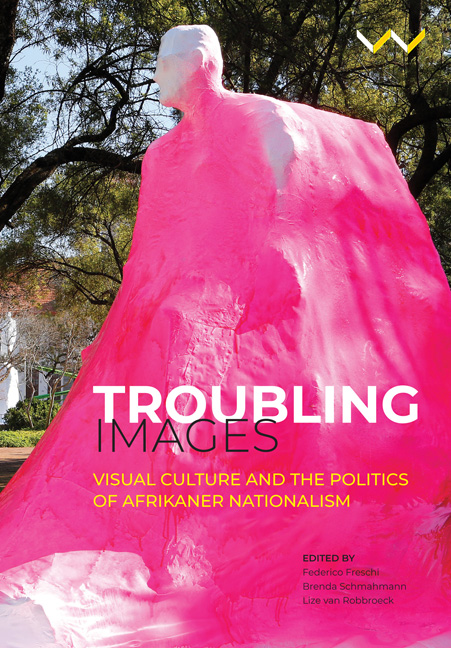Book contents
- Frontmatter
- Contents
- Acknowledgements
- List of Illustrations
- Troubling Images: An Introduction
- 1 The Trajectory and Dynamics of Afrikaner Nationalism in the Twentieth Century: An Overview
- One Assent and Dissent Through Fine Art and Architecture
- Two Sculptures on University Campuses
- Three Photography, Identity and Nationhood
- Four Deploying Mass Media and Popular Visual Culture
- Contributor Biographies
- Index
10 - Cartoonists, Intellectuals and the Construction of Afrikaner Nationalism
Published online by Cambridge University Press: 21 March 2020
- Frontmatter
- Contents
- Acknowledgements
- List of Illustrations
- Troubling Images: An Introduction
- 1 The Trajectory and Dynamics of Afrikaner Nationalism in the Twentieth Century: An Overview
- One Assent and Dissent Through Fine Art and Architecture
- Two Sculptures on University Campuses
- Three Photography, Identity and Nationhood
- Four Deploying Mass Media and Popular Visual Culture
- Contributor Biographies
- Index
Summary
… [T]he archive may be largely about the past, but is always re-read in the light of the present: and in that reprise it always flashes up before us as a moment of danger.
Walter Benjamin quoted in Stuart Hall (2001, 89)The fact that the study of nationalism is so voluminous should hardly come as a surprise. After all, the most powerful narrative of modernity is that of the nation state, which, in essence, is underpinned and driven by the idea of nationalism (Smith 1991, 71). Given this, we duly note that nationalism has been analysed in most disciplinary frames, including history, political science, sociology, law, economics, literature, cultural studies, gender studies, war studies and international relations. The list, it seems, is endless.
But nationalism has a vulgar life, too. It is inherent in everyday life, because it is ‘deeply engrained in the dominant discourses of society’ (Delanty 2007, 475). This life manifests itself especially in cultural form – in that crucial space where the everyday encounter becomes a lifetime of commitment to a particular cause and a way of life. This is where, as the record shows, nationalism can become the most destructive of human forces.
This chapter traces a South African version of this potential pathway to barbarism. Because of this, we will spend time – in the company of Walter Benjamin – thinking about the archive.
In recent times, cartooning about Afrikaners has become a subject of some interest (Verster 2003, 2004 & 2016). But establishing a link between Afrikaner nationalism and the work of those cartoonists who reflected and sought to advance this fateful ideology is not a feature of the literature. An exception is a history master's thesis, written in Afrikaans, by political scientist Dirk Kotze (1988). I will try to draw these two threads a bit closer together: as will become clear, however, the biggest problem in this kind of exploration is to find a suitable vocabulary.
Three framing questions present themselves. Why view nationalism through the optic offered by cartoons? Why, at this point, view one genus of nationalism in South Africa through cartoons that were drawn half a century ago? And, finally, how does one establish a link between the craft of cartooning to the formidable power of nationalism?
- Type
- Chapter
- Information
- Troubling ImagesVisual Culture and the Politics of Afrikaner Nationalism, pp. 248 - 272Publisher: Wits University PressPrint publication year: 2020



